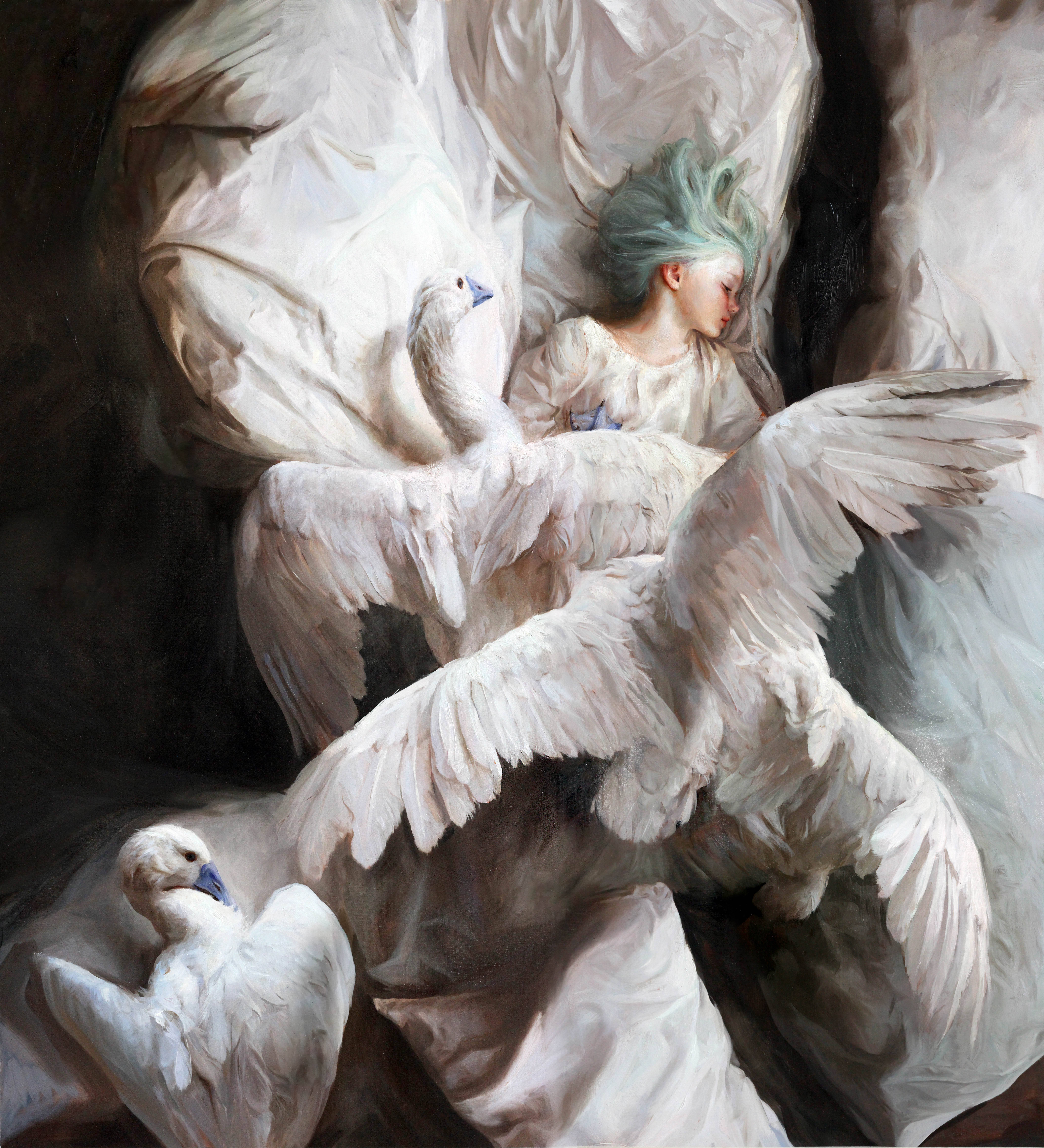
In, Fires, one of Guillermo Lorca’s smaller paintings, a young girl with an intense gaze stares out at the viewer. With rosy cheeks and her hair piled up into a loose bun, her expression is calm and serene, despite a blazing fire behind her. Pink, yellow, and blue flames turn into stifling grays and black, as smoke twists around the scene. Look again and you might notice a small cabin in the distance, or the silhouette of an unexpectedly scrawny cat leaping through the air.
This is textbook Lorca; for him, it’s all about the details. The flames, Lorca says ahead of the opening of his first UK exhibition, come from images he found of the Notre Dame fire earlier this year. “In one part of the painting, you have this explosion that we might relate to something bad,” he explains. “But in the same way, fire is also cleansing and beautiful.”
Guillermo Lorca, Fires (2019). Image courtesy the artist and Asprey.
In a unique collaboration with British luxury brand Asprey, art dealer and auctioneer Simon de Pury has organized a 13-piece exhibition of Lorca’s work at the brand’s headquarters in London. And while the idea of presenting artwork in a shop may seem unusual, Asprey’s New Bond Street location goes far beyond your average storefront.
The premises, which comprise five former townhouses connected by a central courtyard, arguably offer more space than most galleries, and boast beautiful interiors featuring high ceilings adorned with chandeliers, and opulent furnishings. Inside, Lorca’s intricate works decorate the walls of the space as though it were a home.
Guillermo Lorca, The Encounter (2019). Image courtesy the artist and Asprey.
“Every single one of these works require a lot of time; they grow on you,” de Pury says. In the drawing room, before a particularly magnificent space, Lorca and de Pury, along with John Rigas, Asprey’s chairman, sit down to chat about the venture. “I like art not to be on a pedestal,” de Pury says. “The most inspiring thing is to live with art, and I feel like here you can do that, in a way.”
Lorca agrees. “This space is as big as a gallery, so you have the power of two worlds,” he says. “We’re so used to clean, white, stark spaces now, but in Picasso’s [day], you’d view works in the studio of the artist.”
Guillermo Lorca, Spring Pond (2019). Image courtesy the artist and Asprey.
Lorca stands comfortably before one of his largest paintings, The Encounter, as though he were in his own studio. In the piece, a tree, a recurring motif in his work, looms large in the backdrop, while cats, birds, and unidentifiable animals roam the space. It’s both mysterious and emotive, and like several of Lorca’s other paintings, it also includes the image of Javiera Gaeta, his girlfriend and muse. Under one of her feet, Lorca has painted his own decapitated head. “I use the same characters often, but it’s not an obligation,” he says. “I start with something that’s almost impossible to describe because it’s a feeling.”
“I have to have that relationship to an emotion,” Lorca continues, as he walks into another room. “If a feeling lingers for a long time, I think [about] what kinds of symbols, what kinds of actions have a connection to that emotion.” He gestures to Spring Pond, a painting of an otherworldly, blue-striped cat that was born initially out of wild curiosity. “I’d been reading about the Victorian period when people were discovering new species for the first time,” Lorca says. “I wanted to convey that romantic, magical mood.”
Guillermo Lorca, The Zulo’s Game (2019). Image courtesy the artist and Asprey.
Lorca’s fascination with the Old Masters is evident in his skillful painting technique, but he also immerses himself in contemporary culture. One set of paintings depicts young girls with pastel-colored hair (The Landing, The Girl in the Peacock Room, The Zulo’s Game), and he cites both Francis Bacon and the 1980s Japanese animations he watched as a child as influences.
Given Lorca’s deep knowledge of pop culture, it’s fitting that de Pury happened upon his work on social media. “Firstly I thought, My god, this man clearly knows how to paint, his virtuosity is fascinating. There are so many different elements from the history of art that are melded together. Your first impression with these works is always really different from when you start really examining them. You discover a lot of things, some of which are actually disturbing, but one thing is clear: I knew this was a very special talent unlike anyone I’d seen before.”
The exhibition runs through November 3, 2019, at 167 New Bond Street, Mayfair, London W1S 4AY, from Monday–Saturday, 10 a.m.-6 p.m., and Sunday from 12 p.m.–5 p.m.